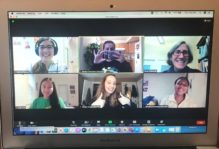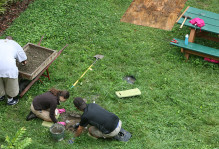Is it really that hard?
A recent local news article describes the work of a small nonprofit that is helping to bring power and other basic necessities to impoverished communities in Africa. The organization tackles small projects. With a budget of about $200,00 and only a few employees, the founder is determined to foster sustainable enterprise. The work is admirable: simple, to the point, and apparently successful.
Why, then, do the two projects described here (SOMOS and SHC) spend so much time studying, researching, and worrying about partnering? One answer is simple and straightforward: We don’t have $200,000, and if we did, there is no obvious way to replace any money that we would spend. A different answer is more complicated but probably more foundational. Our research makes clear beyond the rhetoric that good intentions are not enough.
I want to be clear. I have no idea what the nonprofit organization described earlier is doing by way of community research and engagement. I used the example simply to highlight the problematic nature of the seemingly simple: Why not just go to Paraiso or Cuje and build wells, start rain water harvesting micro-economies, or implement public health education programs?
Here’s what we’ve learned:
- “EdP,” a subcommunity consisting of about 90 households, is the poorest of poor neighborhoods. Even though it is small and very poor, there is some considerable political tension among residents. Although the neighborhood has been in existence only a few years, a local community governance association has been tried and failed because of issues of trust and confidence.
- Even with careful research, it took many weeks just to learn the conventionally accepted (and polite) name for the neighborhood. (At least two others were used derogatorily within the larger community.)
- While there is substantial consensus that access to clean water is a critical health problem, it is not clear that this is a problem around which community members can unite towards some viable and sustainable solution.
So what? Our primary resource is knowledge and the capacity to increase knowledge towards workable solutions. Our primary strategy is partnership: bringing our limited resources to join the resources of the community to implement solutions that can be sustained. We cannot presume to know in advance what to some would seem compellingly obvious. To do so risks implementing projects that seem naive or stupid to community residents, or to start “solutions” that residents know are unresponsive or unsustainable. A few examples:
- When we first arrived in Paraiso, it was “obvious” that they needed a re-cycling program. The area was covered in broken glass, torn tin cans, spoiling food, and general litter. One American tourist who had come to bring candy and toys to the children for Christmas was appalled when she went into the community with us. She asked why we didn’t just tell the people to get out and clean up the place. After all, “they weren’t doing anything else!” We learned that the community has at least three re-cycling projects — and you won’t find any empty El Presidente beer bottles in the area because one of the projects is sponsored and paid for by that company. Litter is considered to be a health problem by local residents — but it probably does not make the top five.
- Early on, we considered a health education project for Cuje. We thought that people could improve their lives if they would purify drinking water and be careful in food preparation. On our second year trip, we visited schools and “base houses” in the community and found extensive literature on water purification and sanitary food preparation. We learned also that people purify water only part of the time — depending on their ability to get chlorine. Money spent on health education, in this instance, probably would have been better spent supplying and distributing chlorine. But there’s another catch: how do you supply chlorine and manage its distribution with no reliable source of income? And, let me be clear, the organization for supplying and distributing must be designed with knowledge of the community, and must be owned and operated by the community.



No comments.
Comments are currently closed. Comments are closed on all posts older than one year, and for those in our archive.